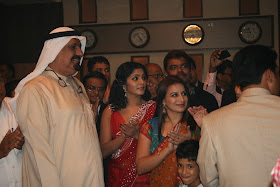
Royal Support
The patronage and presence of the Fujairah Crown Prince, His Highness Sheikh Mohammed bin Hamad Al Sharqi at yesterday’s (23 May 2011) opening ceremony at Le Méridien Resort Al Aqah did much to elevate the importance of the Wetlands Workshop and the Ramsar Convention in West Asia—the Gulf countries, Iran and North Africa.
Organizers
The workshop which continues until 26 May 2011 is hosted by the Environment Protection & Development Department of the Fujairah Municipality and organised by this group, the Ramsar Convention Secretariat, Ramsar Regional Centre RRC-EA, EWS-WWF and supported by the Ministry of Environment and Water (MOEW) of United Arab Emirates, the Secretariat of the League of Arab States and UNEP-ROWA.
Purpose
The workshop is focusing on the national implementation of the Ramsar Convention wetland policies, national policy mechanisms for the conservation and wise use of wetlands by regional organizations and governments. It is exploring greater opportunities for regional cooperation.
Issues
Some of the practical wetland site issues include working with local communities, management planning wetland habitat management, the restoration and monitoring of areas, community education and public awareness and tourism programs.
Participants
More than 30 experts, site managers, governmental officials and NGO representatives are attending the workshop which includes a combination of papers, discussion, field visits to UAE protected areas and formal and informal networking.
Importance of UAE
Adding to their international importance for some breeding species, the UAE wetlands are the last refuelling stop-overs for thousands of migrants waterbirds coming from the Northern Hemisphere breeding grounds (Siberia, Russia) on their way to the Southern Hemisphere wintering grounds (Africa) before crossing the thousands kilometres of Arabian desert.
They also provide a respite for these flying migrants before reaching breeding sites on their way back.
In these arid countries, artificial wetlands (dams, reservoirs, sewage basins, etc.) are attractive as feeding and resting grounds for waterbirds and some have been categorised as of international importance.
Other wetlands like Wadi Wurayah in Fujairah have been shown to host a unique biodiversity and cultural heritage, in addition to freshwater resources. However, because of the recent development of the country, a lot of natural wetlands have shrunk considerably or disappeared.
UAE and Ramsar
Since 2007, the UAE has been a member of the Ramsar Convention, named after the Iranian city of Ramsar, on the southern shore of the Caspian Sea, where the international “Convention on Wetlands” was signed on 2 February 1971.
Ramsar Convention
This convention is an intergovernmental treaty which provides the framework for national action and international cooperation for the conservation and wise use of wetlands and their resources.
The Convention's mission is “the conservation and wise use of all wetlands through local and national actions and international cooperation, as a contribution towards achieving sustainable development throughout the world".
Wetlands Defined
The definition of wetlands according to the text of the Ramsar Convention is the following: “Wetlands are areas of marsh, fen, peatland or water, whether natural or artificial, permanent or temporary, with water that is static or flowing, fresh, brackish or salt, including areas of marine water the depth of which at low tide does not exceed 6 m”.
Value of Ramsar
Although the RAMSAR listing doesn't ensure a protection, it elevates the site to a higher status: the wetland is recognized as a place of “international importance” and it focuses more attention upon it. National governments are then implicitly making a commitment to ensure that the ecological character of the site will be maintained.
UAE Ramsar Sites
In 2008, the first UAE RAMSAR site was declared: Ras al Khor in Dubai and in November 2010, the second Ramsar site for UAE was designated at Fujairah’s Wadi Wurayah.
Wurayah Process
On March 16, 2009, Wadi Wurayah, Fujairah, was designated officially by HH Sheikh Hamad bin Mohammad Al Sharqi, Supreme Council Member and Ruler of Fujairah, as a Protected Area, becoming the first Mountain Protected Area of the United Arab Emirates.
Generous Support
Initiated in 2006, by the Emirates Wildlife Society in association with WWF (EWS-WWF) in partnership with Fujairah Municipality, the Wadi Wurayah project has been generously sponsored by HSBC Bank Middle East, Bridgestone, and with contribution of Jumeirah English Speaking School, Raffles school of Dubai and Higher Colleges of Technology of Fujairah.
Precious Resource
Wadi Wurayah contains mountain as well as freshwater habitats that shelter rare and endangered species. It also provides opportunities for the sustenance and revival of livelihoods of tribal communities. These make the Wadi, undoubtedly, a critical area for environmental and cultural preservation. Work will now commence on establishing a sustainable protected area that will integrate local tradition and lifestyle with the conservation of the Wadi’s biodiversity.
Related
Fujairah to Host Workshop on Wetlands & Ramsar Convention for Region, FIF, 24 May 2011.
Geoff Pound
This article is also posted on the Fujairah in Focus—Facebook Page.
Image: The Crown Prince, His Highness Sheikh Mohammed bin Hamad Al Sharqi, in conversation with international delegates at the Wetlands Workshop in Fujairah.






































